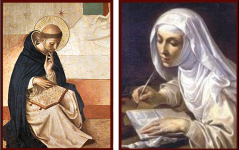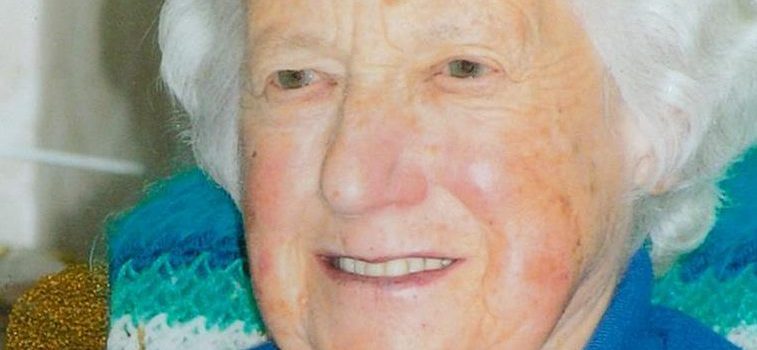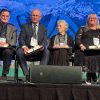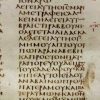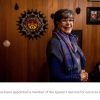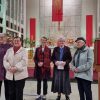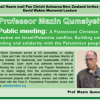Being Dominican
I asked Sister Winefride to tell us a little about her family and their history in New Zealand.
“My father, John Morris, came out from Tyneside, England. When he arrived (at Port Chalmers) there was no one there to meet him. He had come out on a settlement scheme for farmers, arranged by the New Zealand Government. My mother, Sarah, said it was just as well it fell through, because he didn’t know one boot from the other about farming! He was a good, Catholic man, so he marched up to the Bishop’s house to see what he could do. He later became a ‘grip man’ on the trams. He always pointed me out as being “the first of the Colonials” born into the family. He would say, ‘Vera’s the first of the Colonials’, and I thought it must be something very important, so wasn’t greatly impressed when I found out what it meant. My father became a very prominent citizen of Kaikorai.”
You were settled in Kaikorai (a Kaikorai girl) from the beginning?
“Yes – we were eight children – four girls and four boys.”
Her first four siblings, born in England, were Winnie, Mary, Mona and Jim. In her room at Sacred Heart Home, Winefride has a lovely photo of them as young children. Winefride’s other brothers, born in New Zealand, were Pat, Jack and Kevin.
Winefride’s sisters all joined the Little Sisters of the Poor. Two of them left New Zealand at a very early age to train in France, and never returned to this country. Like Winefride, they both lived for a very long time. For much of their lives, one sister lived in Spain and the other in France, but they did correspond with Winefride, who had been very young when they left home. Much later in life, she was able to go and visit them. Her third sister also entered with the Little Sisters in Dunedin, but died while quite young during the time of the Great Flu.
Sister Mary Winefride attended St Mary’s Primary School in Kaikorai, Dunedin, then St Dominic’s College in Dunedin.
When she left school, Winefride attended University, where as part of her studies she completed a Diploma Course in Home Economics. The study was very interesting for her, and later she found it a great help in her teaching of science in our Dominican schools.
During her studies, Professor Strong had asked her if she would take a job over at the Homer Tunnel site in Fiordland. Her mother said she had better take it, as she might not be offered another job. The tunnel was about to be constructed and the men were working at boring through the rocks. When Winefride arrived at the site, she was horrified to find that her living conditions were not what she ever expected. Her accommodation was just a single canvas tent with a wooden frame around it. She has a strong memory of the keas sliding up and down on the roof outside the tent, and sometimes looking down into it! She went there with some other graduates to be of help with research, and was able to take part in discussions about the rock samples. She also worked as a home help at the Homer Tunnel site for a Mr and Mrs (Dave) Stewart. While there, she had a variety of companions.
A very strong memory she shares was that at one stage she was given eight samples of rock from the tunnel area as a souvenir, and kept these for many years. She was very grateful for them, because they were of value later in her Chemistry teaching. In particular, she is pleased to recall that with her background of chemistry, St Patrick’s College at Teschemakers was able to begin presenting it as a course subject for a great many pupils. Winefride stresses that her whole experience at the Homer Tunnel site proved very helpful to her.
In 1974, Sister was given the chance to travel overseas, where in addition to meeting and spending wonderful time with her own two sisters and their communities, she went on to visit many of the lands and foundations of St Dominic and the Dominican Order, including France and Spain, but also Italy and the United States. Her diary of that whole tour, and the people she met on it, makes very interesting reading with many highlights recorded (in a laconic style!). On the inside cover page of the Tour Book, which was presented to her by the Form VL pupils at St Dominic’s College, Dunedin, is a list containing 30 of their names. Sometimes visitors or staff at the Little Sisters’ Sacred Heart Home, on seeing this, will point to a name saying, “That’s my mother!” or “You taught my mother”. It is a matter of joy for Winefride to learn that she was spoken of by many as “a superb teacher”, because she is very proud of her many pupils who went on to do higher studies over the years.
At the end of her teaching days, Sister Mary Winefride moved to Tainui, Dunedin and studied theology and spirituality at Holy Cross College, Mosgiel.
Later still, while living in community with Sister Mary Louise at North East Valley, she began working in the two Dunedin St Vincent de Paul shops, enjoying this involvement immensely. It gave her great opportunities to meet students and young people who were always needing help, especially with the purchase of bargain clothing! Discussing this in a little biographical note written for our congregational records, she said, “Often all a customer needs is a friendly chat or a listening ear.”
She also stated at the time (1998): “In response to (our) Mission Statement I am involved in Ecumenical Groups – the Waverley Craft Group, Holy Name Leisure Group, Sacred Heart Mission Group and Pregnancy Help.” (Winefride was also a superb knitter and crochet worker!)
Her final statement in that record was: “I feel I am living in a time of great challenge to religious life while at the same time enjoying the present, accepting the future with equanimity, and remembering the past with gratitude.” Now in her 100th year, Sister Mary Winefride still lives her life as prayerfully, faithfully and keenly as her many years will allow.
We thank Sr Joan Bennett op for interviewing Sr Mary Windfride
